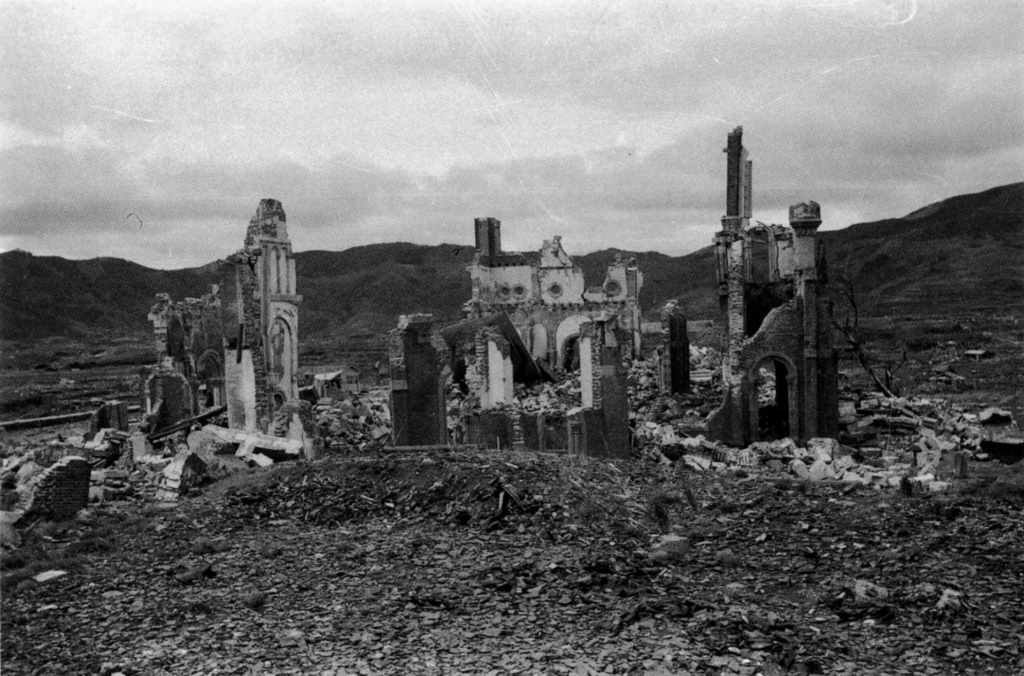Hallow’s Pray40 “The Way” brings to light the powerful testimony of the life of Takashi Nagai, a survivor of the atomic bomb dropped on Nagasaki in 1945. Although there are points in this story that are difficult to hear, Pope Francis reminds us that looking at these gruesome events is vital to our pursuit of peace. In his visit to Nagasaki in 2019, Pope Francis stated, “This place makes us deeply aware of the pain and horror that we human beings are capable of inflicting upon one another.” In this boldness to face these events, we can “turn to God with trust, asking him to teach us to be effective instruments of peace and to make every effort not to repeat the mistakes of the past.” (Pope Francis, Address on Nuclear Weapons)
How are we to understand these horrific events in light of a loving God? What part does God or God’s Will play in these events?
Takashi Nagai, a Catholic Christian convert, saw this tragic event in a startling way that challenges us to view our suffering in union with Christ on the Cross. His view is unique and powerful, emerging from his own loss in light of a loving God. In his speech during the memorial (Day 28 in our Pray40 “The Way” challenge), he spoke of the deaths of the Catholic Christians in Urakami and those widely across Nagasaki as having a holy purpose. His words should give us pause:
“I have heard that the atom bomb. . . was destined for another city. Heavy clouds rendered that target impossible, and the American crew headed for the secondary target, Nagasaki. Then a mechanical problem arose, and the bomb was dropped further north than planned and burst right above the cathedral. . . . It was not the American crew, I believe, who chose our suburb. God’s providence chose Urakami and carried the bomb right above our homes. Is there not a profound relationship between the annihilation of Nagasaki and the end of the war? Was not Nagasaki the chosen victim, the lamb without blemish, slain as a whole burnt offering on an altar of sacrifice, atoning for the sins of all the nations during World War II?”
Takashi did not view the use of the atomic bomb as the will of God; instead, he viewed that since God allowed this terrible suffering on the people of Nagasaki, they should accept that suffering with a holy purpose—that through them, it could bring God’s will for peace. For this reason, Takashi Nagai felt that the choice of Nagasaki as the site of the devastation was divine providence.
It should be noted that Takashi Nagai was a layman and not someone trained as a theologian. He was a Catholic doctor who was trying to process and make sense of the horrors of war through the lens of his faith. For further understanding, we should turn to what the Church teaches about God and the problem of evil.
We know that God is all good. While He does not directly cause evil, He does allow it to happen. The Catechism of the Catholic Church speaks to this reality in paragraph 324: “The fact that God permits physical and even moral evil is a mystery that God illuminates by his Son Jesus Christ who died and rose to vanquish evil. Faith gives us the certainty that God would not permit an evil if he did not cause a good to come from that very evil, by ways that we shall fully know only in eternal life.”
The horrors of war and the events of the atomic bomb found in the story of Takashi Nagai challenge us to experience this mystery, sometimes in profound ways. For more on this topic, see the Catechism section (309-314), On Providence and the Scandal of Evil.
So what does the Church teach on the use of Nuclear Weapons?
Paragraph 2314 in the Catechism of the Catholic Church states,
“Every act of war directed to the indiscriminate destruction of whole cities or vast areas with their inhabitants is a crime against God and man, which merits firm and unequivocal condemnation.” (GS 80, 3) A danger of modern warfare is that it provides the opportunity to those who possess modern scientific weapons especially atomic, biological, or chemical weapons – to commit such crimes.”
In his visit to Nagasaki in 2019, Pope Francis stated, “One of the deepest longings of the human heart is for security, peace and stability. The possession of nuclear and other weapons of mass destruction is not the answer to this desire; indeed they seem always to thwart it.”
The Catholic Church takes a firm stance against the use of nuclear weapons and has been advocating for disarmament around the world:
“For her part, the Catholic Church is irrevocably committed to promoting peace between peoples and nations. This is a duty to which the Church feels bound before God and every man and woman in our world. We must never grow weary of working to support the principal international legal instruments of nuclear disarmament and non-proliferation, including the Treaty on the prohibition of nuclear weapons.” (Pope Francis, Address on Nuclear Weapons, Nagasaki, 2019)
We at Hallow know the story of Takashi Nagai is hard for many to hear. Our hope is that in becoming aware of the horrors that attempt to destroy and thwart the desire for peace, we find union is God’s desire for peace and, hopefully, become peacemakers in our communities.
For further reading, view the USCCB Statement on Nuclear Weapons and the speech of Pope Francis during his visit to Nagasaki in 2019.
